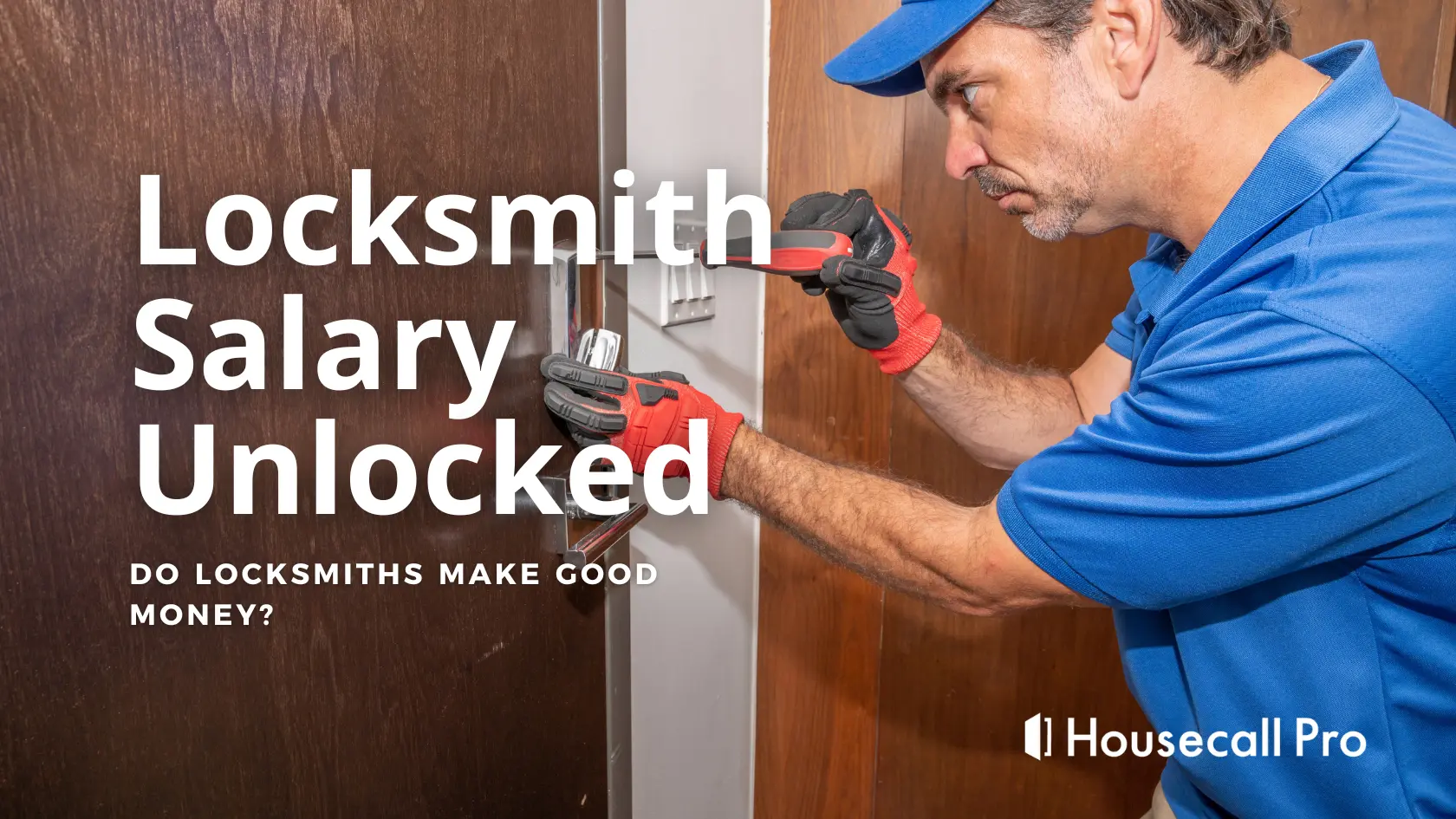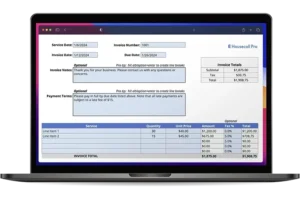
Want to see your potential revenue?
See what businesses like yours earn with Housecall Pro in 1 - 2 minutes.

Locksmiths make an average of $50,490, or $24.27 per hour, but your pay can look different depending on where you live, who you work for, and your skill set.* Many locksmiths start with a high school diploma or GED and learn the trade through vocational training or apprenticeships. Adding certifications can help you stand out and earn more.
In this guide, we’ll break down locksmith salaries across the U.S., explain what affects your pay, and share tips for making more money in the field.
*All data compiled from the U.S. Bureau of Labor Statistics.
- Do locksmiths make good money? Key highlights
- Average locksmith salary by experience level
- How much locksmiths make by state: Hourly and annual wages
- What states pay locksmiths the most?
- What states pay locksmiths the least?
- What type of locksmith makes the most money?
- What affects a locksmith’s salary?
- How to increase your locksmith salary
- Starting your own locksmith business
Do locksmiths make good money? Key highlights
- Locksmith salaries typically range from $34,750–$79,340.
- Top-paying states include Connecticut, Rhode Island, and Washington, D.C.
- Experience is one of the biggest drivers of pay.
- Certifications and specializations (smart locks, automotive, institutional work) increase your earning potential.
- Government and institutional jobs often pay more than residential services.
Average locksmith salary by experience level
The more experience you have, the more you can make as a locksmith. Practice, hands-on training, and specialization can all help you earn pay bumps. Whether you’re just starting out or moving into advanced roles, here’s a look at your potential earning growth.
Entry-level locksmith salary
Average salary: $34,750
Average hourly rate: $16.71
Entry-level locksmiths are typically just starting out in the field. You’ll learn the basics of key cutting, lock installation, and residential lock repair. Most entry-level locksmiths have completed vocational training or an apprenticeship and may have a basic locksmith license in their state.
Journeyman locksmith salary
Average salary: $50,490
Average hourly rate: $24.27
A journeyman locksmith has more experience and training, often 2–4 years in the field. You can handle more complex residential, commercial, and automotive locks, including master key systems.
Training typically involves a combination of apprenticeships, on-the-job experience, and specialized courses. Many journeyman locksmiths also start earning certifications from organizations like the Associated Locksmiths of America (ALOA), which can boost credibility and pay.
Master locksmith salary
Average salary: $38.14
Average hourly rate: $79,340
Master locksmiths have extensive experience and advanced training, often including several years in specialized areas such as safe and vault work, high-security systems, or institutional locksmithing.
At this level, you can supervise teams, consult on complex security systems, and manage large commercial or government accounts. Becoming a master locksmith usually requires advanced certifications, ongoing education, and 7-10 years of hands-on experience.
How much locksmiths make by state: Hourly and annual wages
Locksmith salaries can vary a lot depending on factors like cost of living, population density, and local economic conditions. High-cost or metro-heavy states typically pay more because the work can be more complex and in higher demand. Smaller towns or rural areas may offer lower pay, but they often come with lower overhead costs and less competition.
Here’s a detailed breakdown of locksmith salaries by state:
| State | Hourly | Annual |
|---|---|---|
| Alabama | $21.22 | $44,140 |
| Alaska | $28.51 | $59,300 |
| Arizona | $20.83 | $43,320 |
| Arkansas | $17.76 | $36,930 |
| California | $29.57 | $61,500 |
| Colorado | $27.40 | $56,984 |
| Connecticut | $30.99 | $64,470 |
| Delaware | $24.29 | $50,520 |
| District of Columbia | $35.81 | $74,470 |
| Florida | $22.89 | $47,610 |
| Georgia | $29.62 | $61,610 |
| Hawaii | $27.07 | $56,303 |
| Idaho | $22.26 | $46,290 |
| Illinois | $22.77 | $47,360 |
| Indiana | $23.71 | $49,320 |
| Iowa | $21.63 | $45,000 |
| Kansas | $24.00 | $49,920 |
| Kentucky | $21.56 | $44,850 |
| Louisiana | $19.42 | $40,390 |
| Maine | $23.40 | $48,670 |
| Maryland | $28.51 | $59,310 |
| Massachusetts | $30.13 | $62,670 |
| Michigan | $28.16 | $58,570 |
| Minnesota | $29.53 | $61,420 |
| Mississippi | $21.64 | $45,000 |
| Missouri | $22.83 | $47,490 |
| Montana | $22.96 | $47,760 |
| Nebraska | $22.82 | $47,470 |
| Nevada | $26.12 | $54,330 |
| New Hampshire | $26.48 | $55,070 |
| New Jersey | $28.51 | $59,300 |
| New Mexico | $21.73 | $45,190 |
| New York | $28.63 | $59,560 |
| North Carolina | $20.28 | $42,190 |
| North Dakota | $23.15 | $48,150 |
| Ohio | $21.13 | $43,960 |
| Oklahoma | $21.72 | $45,170 |
| Oregon | $23.93 | $49,780 |
| Pennsylvania | $25.84 | $53,750 |
| Rhode Island | $35.15 | $73,120 |
| South Carolina | $22.09 | $45,950 |
| South Dakota | $26.05 | $54,192 |
| Tennessee | $21.69 | $45,110 |
| Texas | $21.49 | $44,700 |
| Utah | $22.93 | $47,690 |
| Vermont | $27.70 | $57,620 |
| Virginia | $27.88 | $57,990 |
| Washington | $24.29 | $50,520 |
| West Virginia | $22.42 | $46,630 |
| Wisconsin | $22.94 | $47,720 |
| Wyoming | $25.04 | $52,090 |
Read more: How to become a locksmith
What states pay locksmiths the most?
Certain states pay more because of demand, cost of living, and the types of clients you’ll work with. Connecticut and Rhode Island have the highest wages thanks to a combination of urban density, aging infrastructure, and strong demand for residential and commercial security upgrades.
D.C. locksmiths also earn big. Many work with government agencies or high-security facilities, handling complex systems like electronic access control and high-security safes.
| State | Low | Median | High |
|---|---|---|---|
| Georgia | $30,100 | $61,610 | $74,240 |
| Massachusetts | $46,930 | $62,670 | $97,720 |
| Connecticut | $44,880 | $64,470 | $97,360 |
| Rhode Island | $37,440 | $73,120 | $86,210 |
| District of Columbia | $69,760 | $74,470 | $74,990 |
What states pay locksmiths the least?
Areas with fewer commercial properties, smaller populations, or lower service rates tend to pay less. States like Arkansas, Louisiana, North Carolina, Arizona, and Ohio fall into this category. However, lower overhead and less competition can help small businesses and solo locksmiths thrive.
| State | Low | Median | High |
|---|---|---|---|
| Arkansas | $27,040 | $36,930 | $57,690 |
| Louisiana | $20,000 | $40,390 | $81,370 |
| North Carolina | $28,090 | $42,190 | $69,160 |
| Arizona | $35,350 | $43,320 | $77,490 |
| Ohio | $36,040 | $43,960 | $64,140 |
What type of locksmith makes the most money?
Some locksmith jobs pay more because of the environment, risk level, or complexity of the security systems involved. Locksmiths working in specialized institutions or government settings often make more than those in traditional residential or commercial roles.
Here are some of the highest-paying locksmith jobs:
- Local government locksmith ($74,000–$75,000): Works for municipalities, maintaining and securing government buildings, often handling high-security systems.
- Junior college locksmith ($67,000–$68,000): Manages key systems and lock maintenance for college campuses, often requiring experience with master key systems and electronic locks.
- Hospital locksmith, psychiatric/substance abuse facilities ($67,000–$68,000): Ensures controlled access in sensitive healthcare environments with heightened safety requirements.
- State government locksmith ($65,000–$67,000): Provides security and lock system oversight for state-run facilities, requiring compliance with strict access protocols.
- Hospital locksmith, general medical facilities ($65,000–$66,000): Maintains and repairs locks in high-traffic hospital settings, including restricted areas like pharmacies and operating rooms.
What affects a locksmith’s salary?
Several factors can influence how much you make as a locksmith. Whether you’re just entering the field or looking to increase your income, knowing these variables can help you take the right steps toward higher pay and long-term success.
Certifications and specializations
Earning certifications through the ALOA can give you a competitive edge in the market. Explore credentials in high-demand areas like Safe & Vault Technician, Automotive Locksmith, Institutional Locksmith, Investigative & Forensic Locksmith, and Fire Door Inspection.
While certifications like LEED are more common in construction and building design, some locksmiths earn this credential to work more closely with green-certified commercial properties and government facilities.
Role and leadership responsibilities
Your role on the team matters. Locksmiths who specialize in one area, like residential or auto work, often earn less than those in supervisory or management positions. If you’re leading projects, training others, or managing service teams, you’re more likely to earn a higher salary due to the added responsibility and organizational value you bring.
Locksmith demand and market outlook
According to recent data, there are approximately 18,200 locksmiths currently employed in the U.S. The job market is expected to decline by about 11.5% between 2022 and 2032. However, those who stay up-to-date with modern security systems, digital locks, and access control technologies will remain in demand, especially in healthcare, government, and commercial construction.
How to increase your locksmith salary
Though the market for locksmiths is declining, that doesn’t mean there aren’t opportunities to increase your salary. Here are a few tips to boost your pay:
- Earn certifications in specialized areas like automotive locksmithing, fire door inspection, or safe and vault work.
- Stay up-to-date with electronic and smart lock technologies to expand your service offerings.
- Build long-term relationships with commercial clients or institutions for steady, higher-paying work.
Read more: 10 marketing strategies and ideas to get more locksmith leads
Starting your own locksmith business
Making the leap from employee to business owner can increase your salary significantly. While it comes with more responsibility, it also gives you full control over your rates, workload, and how fast you grow.
While starting your own business can be intimidating, the right tools can help you work smarter and faster from day one. With Housecall Pro’s locksmith software, you can:
- Schedule and dispatch jobs efficiently
- Automate invoices and payments
- Track performance metrics and profitability
- Manage customer relationships for repeat business and referrals
Take control of your future. Start your free 14-day trial with Housecall Pro today and see how easy it is to run your locksmith business with confidence.







